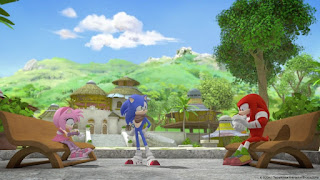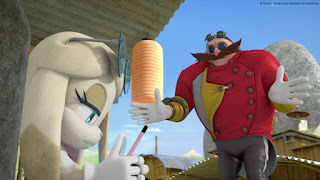Sonic Boom, Episode 2.44: Vector Detector
Original Air Date: September 9th, 2017
In retrospect, it's funny how much effort the "Sonic Boom" writers invested in building up the show's supporting cast in the second season. "Sonic the Hedgehog," as a franchise, is rather notorious for the ten thousand characters it has. Why spend so much time on Dave the Intern when you could have devoted an episode to beloved characters like Blaze or Silver? Hardcore fans ask questions like this all the time but the answer is obvious. Show runners and writers naturally want to develop their own world. Writers tend to make stuff their own. Creatives create. Speaking as a fan and a pretentious writer guy, I understand both perspectives. When you are banging away at a keyboard, cranking out a story, it's only natural that you're going to get invested in the deep, tragic backstory of Wade Whipple. At the same time, it does feel like a bit of a waste to have access to the vast library of "Sonic the Hedgehog" lore and not utilize more of it. When you are telling a story in an established universe, is it better to make up a new guy, to fit the needs of the plot you're writing, or should you take a pre-existing character and twist them to feed your narrative? As a fan, is it more important that the thing you like gets referenced or that it is portrayed in a way that's faithful to what made you love it in the first place? These are debates people have been having about adaptations since the beginning of human civilization.
In other words: Does Vector the Crocodile appearing in an episode of "Sonic Boom" matter more to you than the version of Vector the Crocodile you specifically love showing up at all? It's hard to say how much the "Boom" writers grappled with these questions. Considering the show would rather throw in another joke at Old Monkey or Mayor Fink's expense than reference anything from the "Sonic" video games, I doubt it was on their minds much at all. However, rarely, the show would grab someone from established "Sonic" lore to fill a role. Considering Shadow only showed up in a season finale or Metal Sonic randomly appeared in a middling installment, this can feel like a cynical attempt to build hype. Was "Vector Detector" written because ratings were sagging and execs knew tossing in a Sega character would create buzz? Or did Reid Harrison genuinely want to use this crocodile guy, because he's a fan or he knew Vector fit the role in the story he was making? I guess we'll never know. Really, it doesn't matter. None of this matters.
Nihilism aside, let's talk about the actual episode. Much like that one issue of the "Boom" comic book, "Vector Detector" begins with Amy noticing her beloved hammer is missing. Feeling existential angst without her trademark accessory, Amy hires a private detective to recover her beloved mallet. Vector the Crocodile, star of a reality TV show dedicated to following his exploits, is on the case. Sonic, eager to prove his own skills as a crime solver, tags along on the investigation. Together, the two follow a series of clues, discarding false leads and dead ends, that lead to the identity of the hammer thief.
Long time readers of this blog will know that I have a complicated history with Vector the Crocodile. For years, with only one appearance in a launch title for a Genesis add-on a total of six people bought, Vector was mostly defined by his appearances in the Archie "Sonic" and "Knuckles" comics. There, Ken Penders wrote him largely as an obnoxious dumb-ass who existed to be mad at Knuckles' girlfriend – because he was in love with him??? – and spout embarrassing white guy attempts at hip-hop slang. Years later, Sega would dust the reptile off and zero in on a, up to then, downplayed part of his personality: His status as a detective. Naturally, this revamped version of Vector reached a far wider audience than the obscure Archie take. Which is probably for the best, as Knuckles really didn't need a token black friend yelling "Dayum!" or "That is whack!"
Relics of Vector's past as a reductive stereotype still linger, such as his gold chain and headphones, but most "Sonic" media has gone all in with the detective thing. That's what "Sonic Boom" does. Their version of Vector peppers his dialogue with hard-boiled P.I. phrases. Palooka, vic, jamoke, and eighty-sixed are in his vocabulary. He calls Amy a "skirt," says someone "copped" her hammer, and accused the criminal of being a "mug." I always enjoy hearing ridiculous, old-timey slang tossed into a contemporary setting with little to no explanation. Harrison's smartly doesn't draw any attention to Vector's bizarre way of speech. However, I think more humor could've been derived from the contrast between the way he looks and sounds and his dialogue. "Boom" designers dropped the headphones and threw a leather jacket over top the standard Sega version. Keith Silverstein has been the voice of Vector since 2010, giving the crocodile a big, exaggerated sound that I've never thought fit him. (In my brain, he sounds like Tracy Morgan.) If "Boom" wanted to play into the detective thing, they should've had Vector in a fedora and trench coat, giving him a Brooklyn accent or something. Or else made a joke of why he sounds like that when he's dressed like a deejay.
Special Guest Star Vector the Crocodile may be at the center of the story but "Sonic Boom" is still firmly entrenched with its own cast. Comedy Chimp, Wolf T. Sidekick, and Justin Beaver are all potential suspects in the hammer-napping. Fastidious Beaver has a cameo, so on and so forth. By now, "Boom" has firmly established its group of background players. That everyone in this village is always so mean-spirited and reactionary makes any of them a potential suspect. The mystery itself is not that hard to untangle. However, the trail of clues Sonic and Vector follow goes down enough wrong turns to keep me guessing for a little bit. The script copies the structure of a detective story enough to keep me intrigued throughout. This leads to some decently silly parodies of detective movie tropes, such as Vector absurdly noticing some clues that Sonic didn't see right before him, both of them playing bad cop with Dave, and a typically self-aware riff on stake-out scenes.
Weirdly, the episode doesn't commit one hundred percent to the hard-boiled detective premise. Instead of merely being a private investigator, Vector is the star of a reality show where a camera crew follows him around as he unravels mysteries. It looks like a cross between "COPS" and "Dog the Bounty Hunter" or something but features cheesy scene transition, more akin to a sketch show from the eighties. I expected this to escalate into a proper parody of reality television, a well this show has returned to at least twice before. Instead, it's a plot point that never goes anywhere. Vector is followed around by a camera crew and that never becomes part of the story. I kept expecting a reveal that the producer or Vector were planting evidence, to make a mundane story more exciting. Or that he stole Amy's hammer in the first place, in order to necessitate being hired. Something like that kind of happens but Vector is unconnected to it and the crime has no relation to the TV show element. Definitely strikes me as a bit of a missed opportunity.
The episode could have ran with its ideas a little more but "Vector Detector" still made me reliably chuckle. This is the first episode Reid Harrison has scripted in a while. As was the style in his season one episode, this one is packed full of jokes and sight gags. Some are self-aware in nature. Such as Amy and Knuckles obliquely commenting on how "Sonic" characters are defined by a central gimmick. Or Tails commenting on how Sonic escalated a fight with Eggman. The mad doctor, showing up for one scene of robot smashing, is a nicely irrelevant joke. As you expect from Reid, any dead space in the story is filled with tossed-off jokes. The best of which is the town cop telling a crowd that "there's nothing to see here" before noticing the crime scene and changing his mind. Or, upon seeing Justin and Fastidious interacting, Sonic deadpan suggesting that some sort of beaver conspiracy is afoot. "Boom's" silliness insists upon itself sometimes – and does so here, in a moment involving a pie eating contest – but I like the way that Harrison's one-liners casually zip by.
I did find myself wishing Amy played a bigger role in this story. She's front and center in the opening scenes. The first moment is an amusing sequence of her greeting all the inanimate objects in her house in an overly sunshiny manner. During the fight with Eggman, she forgets she's not holding her hammer and becomes despondent, depressed without her favorite weapon. As soon as Vector enters the story, the perspective shifts totally to Sonic and the crocodile. However, Amy being confused and weepy simply because she's without her hammer could have led to way more jokes of its own. Then again, as I pointed out earlier, one of the comics featured a similar story so perhaps there was a fear of stepping on another writer's toes. Hearing Cindy Robinson act out such a scenario might have been worth it though.
Airing so late into "Sonic Boom's" run, "Vector Detector" is naturally the character's only meaningful appearance on the show. If "Boom" had gotten a third season, I wonder if the other Chaotix might have appeared? Cartoon Network screwing this show truly robbed us of a chance to see how much speed tape the "Boom" versions of Espio and Charmy might've worn. Or at least we could have learned why this version of the crocodile has a compass tattoo on his bicep. Anyway, decent episode, even if some of its ideas are better realized than others. [7/10]





































